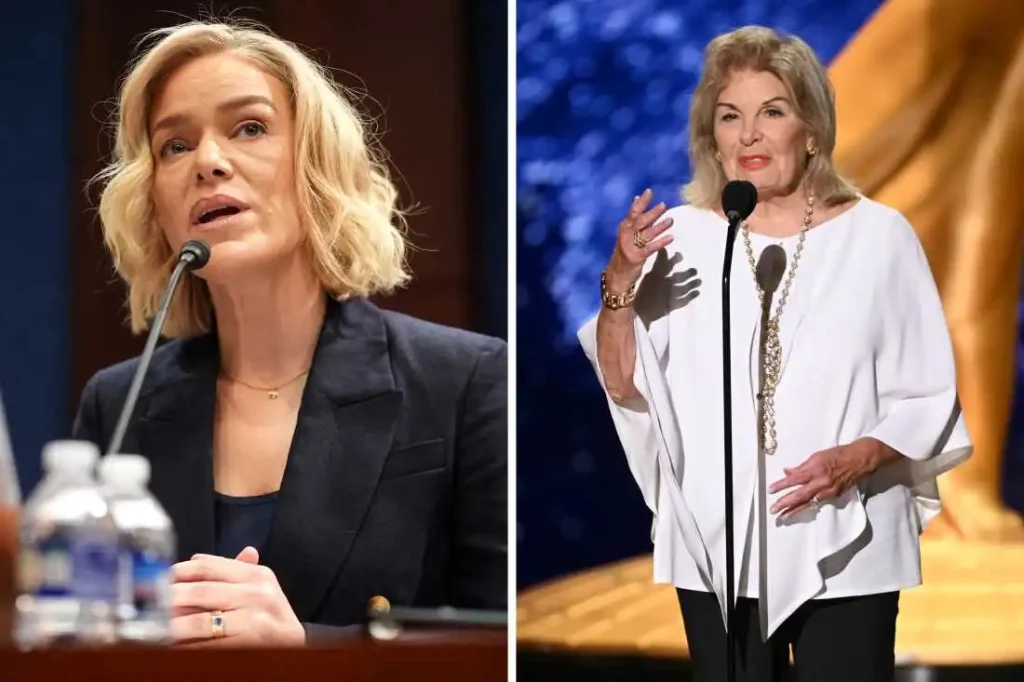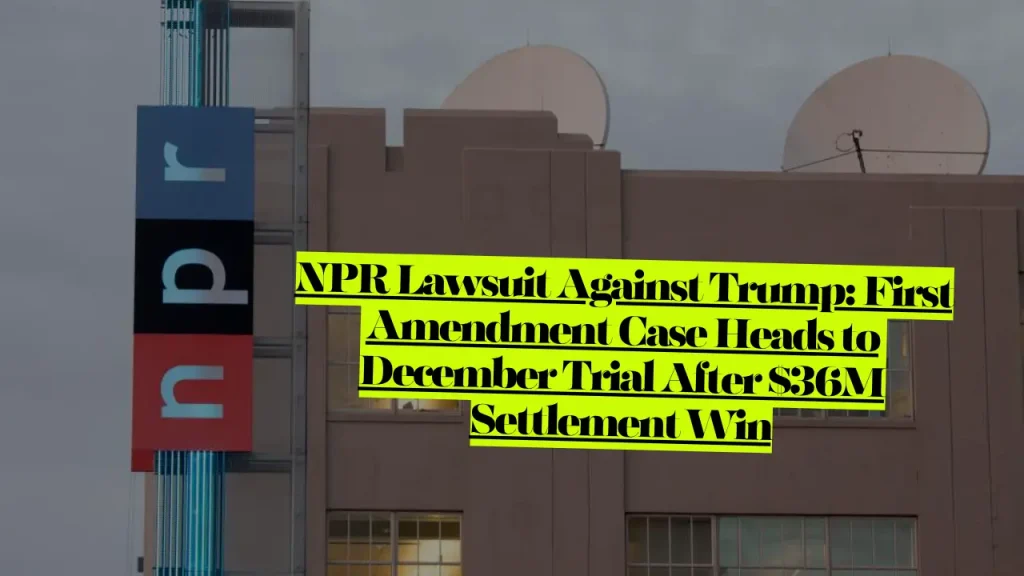NPR Lawsuit Against Trump, First Amendment Case Heads to December Trial After $36M Settlement Win
NPR and three Colorado public radio stations filed a First Amendment lawsuit against President Trump in May 2025, challenging his executive order to cut federal funding for public media, with a hearing on the constitutional claims scheduled for December 2025. The Corporation for Public Broadcasting agreed to fulfill a $36 million contract with NPR in November 2025, resolving one portion of the dispute. The case exposes tensions between presidential power, press freedom, and congressionally appropriated funds that sustain public broadcasting.
What Is the NPR Lawsuit About?
Trump’s May 1, 2025 executive order directed the Corporation for Public Broadcasting to cease federal funding for NPR and PBS, claiming neither “presents a fair, accurate, or unbiased portrayal of current events”. NPR receives approximately 1% of its operating budget directly from the federal government, with public radio stations receiving 8-10% of their revenue from CPB on average.
The lawsuit calls the order “textbook retaliation” for editorial content the president disagrees with. The legal filing states: “It is not always obvious when the government has acted with a retaliatory purpose in violation of the First Amendment. ‘But this wolf comes as a wolf'”.
Related lawsuit: Character AI Lawsuit Latest 2025, Federal Judge Denies First Amendment Defense as Multiple Families File Claims After Teen Deaths

What Triggered This Federal Lawsuit?
Trump began attacking NPR and PBS as “radical left MONSTERS” on social media shortly after returning to the White House in 2025. Congressional Republicans, influenced by Project 2025’s policy roadmap, had called for defunding both organizations.
The White House fact sheet accompanying the executive order cited NPR’s COVID-19 lab leak coverage and Hunter Biden laptop reporting as examples of alleged bias. Behind the scenes, CPB officials questioned how to present their decision to sever ties with NPR without directly acknowledging political pressure, with internal communications showing executives asking consultants for messaging strategies.
What Are the Legal Claims Involved?
NPR’s lawsuit asserts three primary legal violations:
First Amendment Retaliation: The lawsuit argues Trump admitted using executive power to target NPR because he disagrees with their speech content, which constitutes viewpoint-based discrimination prohibited by the First Amendment.
Freedom of Association: The order violates member stations’ First Amendment rights by directing CPB to prohibit stations from using federal funds to purchase NPR programming, directly interfering with their editorial choices.
Separation of Powers: The lawsuit contends Trump usurped Congress’s constitutional power to direct how federal money is spent, as Congress had appropriated $535 million yearly to CPB for 2025, 2026, and 2027.
Who Are the Parties in the Lawsuit?
Plaintiffs: NPR, Colorado Public Radio, Aspen Public Radio, and KSUT Public Radio (serving four federally recognized Native American tribes).
Defendants: President Trump, White House budget director Russell Vought, Treasury Secretary Scott Bessent, and National Endowment for the Arts chair Maria Rosario Jackson.
Noted First Amendment attorney Theodore J. Boutrous of Gibson, Dunn & Crutcher is representing NPR. PBS is not a party but stated it’s considering legal action.
What Is the Current Case Status?
The case is assigned to U.S. District Court Judge Randolph D. Moss in the District of Columbia, who is also handling a related lawsuit by the Corporation for Public Broadcasting against Trump over attempted board member firings.
Major November 2025 Development: Judge Moss found CPB had not made a credible case for reneging on the satellite distribution contract just one day after a White House official warned against doing business with NPR. Under the settlement, NPR and CPB agreed that Trump’s executive order “is unconstitutional and that CPB will not implement or enforce it unless ordered by a court”.
A December 2025 hearing is scheduled on the constitutional merits of NPR’s First Amendment claims against the executive order. A trial had been set for December 1 on the CPB contract dispute before the settlement.
What Jurisdiction Is the Case In?
U.S. District Court for the District of Columbia handles the case. This federal court has jurisdiction because the lawsuit challenges a presidential executive order affecting congressionally appropriated funds and alleges constitutional violations.
The D.C. venue is strategic—the court frequently adjudicates disputes between federal branches and has established First Amendment precedents regarding government retaliation.

Timeline of Key Events
March 2025: Trump intensified social media attacks on NPR, with Republican House hearings targeting NPR CEO Katherine Maher over pre-employment social media posts.
April 2, 2025: CPB’s board approved extending NPR’s contract for satellite distribution services, agreeing to transfer over $35 million.
April 14, 2025: CPB called NPR to inform them the contract extension was cancelled, the same day published reports reflected Trump’s renewed push to cut public media funding.
May 1, 2025: Trump issued the executive order directing CPB and federal agencies to cease funding for NPR and PBS.
May 27, 2025: NPR and three Colorado stations filed the lawsuit.
Summer 2025: Republican Congressional leaders pulled back $1.1 billion for future public broadcasting that had already been approved and signed into law.
September 2025: NPR filed a motion to block CPB from awarding a $57.9 million grant to a new consortium for satellite system operations.
October 2025: Judge Moss ordered an expedited trial after expressing skepticism of CPB’s arguments, saying “the most plausible explanation” was that CPB was “understandably trying to survive” political pressure.
November 17, 2025: NPR and CPB reached a settlement, with CPB agreeing to proceed with funding and NPR dropping claims against the contract award.
What Does the Public Need to Know?
NPR says it provides infrastructure services to hundreds of public radio stations and serves as the backbone for emergency alert systems across the country. Without federal funding, smaller rural and tribal stations face existential threats.
CPB has effectively ignored Trump’s orders thus far, retaining board members and taking no actions to withhold money from NPR, PBS, or member stations. The Public Broadcasting Act structured CPB as a private nonprofit corporation specifically to insulate public media from political interference.
White House spokesperson Harrison Fields defended Trump’s action, stating CPB “is creating media to support a particular political party on the taxpayers’ dime” and the president is “exercising his lawful authority to limit funding”.
What Are the Implications of This Case?
For Press Freedom: The Reporters Committee for Freedom of the Press and 29 NPR member stations filed a friend-of-the-court brief arguing the order “strikes at the heart of free speech and a free press”.
For Presidential Power: The case tests whether presidents can use executive orders to defund media organizations based on content disagreements, potentially setting precedent for future administrations.
For Public Broadcasting: Attorney Theodore Boutrous told CNN the 1967 Public Broadcasting Act was clearly meant to “insulate” networks from “precisely this type of political coercion”.
Comparative Analysis: Similar to Trump’s tariff cases currently before the Supreme Court, this lawsuit questions the limits of executive authority to bypass Congressional appropriations. Legal scholars note that when government acts with retaliatory purpose to punish protected speech, it constitutes one of the most egregious First Amendment violations.
What Are the Next Steps?
The December 2025 hearing will address NPR’s constitutional claims against Trump’s executive order. Katherine Maher stated: “We look forward to our day in court in December”.
If Judge Moss rules the executive order violates the First Amendment, Trump’s administration could appeal to the D.C. Circuit Court of Appeals and potentially the Supreme Court. A ruling against the order could restore NPR’s federal funding access and establish important precedent limiting executive retaliation against media.
The settlement of the CPB contract dispute removes one layer of litigation, allowing focus on the core constitutional question: Can a president defund news organizations whose coverage he dislikes?
Related Legal Resources
For more information on related cases:
- First Amendment Lawsuits and Press Freedom Claims
- Federal Government Overreach Cases
- Media Defamation and Content Dispute
Frequently Asked Questions
Q: What is the NPR lawsuit about?
NPR is suing President Trump over his May 2025 executive order attempting to cut federal funding for public media. The lawsuit alleges First Amendment violations, claiming Trump is retaliating against NPR for news coverage he disagrees with and violating constitutional separation of powers by usurping Congressional spending authority.
Q: What triggered the NPR lawsuit?
Trump’s executive order followed months of public attacks calling NPR “left-wing propaganda.” The immediate trigger was CPB cancelling a $36 million contract with NPR in April 2025 after White House pressure, followed by Trump’s May executive order directing all federal agencies to cease funding NPR and PBS.
Q: What are the main legal claims in the NPR lawsuit?
The lawsuit asserts three claims: (1) First Amendment retaliation for protected speech, (2) violation of freedom of association rights by forcing stations to stop using NPR programming, and (3) separation of powers violations by attempting to override Congressional appropriations.
Q: What is the current status of the NPR lawsuit?
In November 2025, NPR and CPB settled the contract dispute, with CPB agreeing to fulfill the $36 million agreement. The core constitutional case against Trump’s executive order continues, with a hearing scheduled for December 2025 in D.C. federal court.
Q: What is the timeline of the NPR lawsuit?
March-April 2025: Political pressure intensifies; May 1, 2025: Trump issues executive order; May 27, 2025: NPR files lawsuit; October 2025: Judge orders expedited trial; November 17, 2025: Settlement on contract dispute; December 2025: Constitutional hearing scheduled.
Q: What are the implications of the NPR lawsuit?
The case could establish important precedent on limits of presidential power to defund media based on content disagreements. A ruling for NPR would reinforce First Amendment protections against government retaliation, while a ruling for Trump could expand executive authority over federally-funded institutions.
Q: What happens next in the NPR lawsuit?
The December 2025 hearing will address whether Trump’s executive order violates the First Amendment. Judge Moss will rule on NPR’s constitutional claims, with potential appeals to the D.C. Circuit and Supreme Court depending on the outcome. The case’s resolution could reshape the relationship between federal funding and editorial independence.
Legal Disclaimer: This information is for educational purposes only and does not constitute legal advice. Case details, legal claims, and outcomes may change. Review current case filings independently and contact an attorney for specific questions about this lawsuit. For updates on the NPR lawsuit and other major legal developments, visit AllAboutLawyer.com.
About the Author

Sarah Klein, JD, is a licensed attorney and legal content strategist with over 12 years of experience across civil, criminal, family, and regulatory law. At All About Lawyer, she covers a wide range of legal topics — from high-profile lawsuits and courtroom stories to state traffic laws and everyday legal questions — all with a focus on accuracy, clarity, and public understanding.
Her writing blends real legal insight with plain-English explanations, helping readers stay informed and legally aware.
Read more about Sarah
